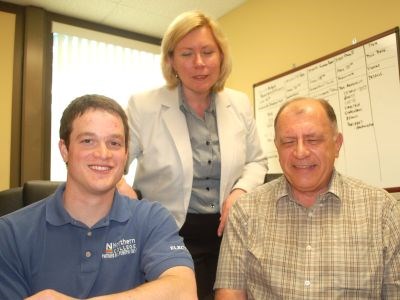Northern College's foray into applied research has resulted in many benefits beyond the final findings. Northern's students taking part in the research programs are developing new skills that make them more marketable to prospective employers.
“The students will leave with the ability to actually understand how to undertake applied research and that is solving practical problems,” said George Hughes, research project manager and consultant. “They are solving real-world problems, dealing with teams and dealing with realworld clients,” said Tori Hanson, director of trades and technology for the college.
The college, along with all other 23 colleges in the province, now belongs to Colleges Ontario Network forIndustry Innovation (CONII).
It connects Ontario's small- and medium-sized enterprises (SMEs) and other industry partners to the applied research and commercialization expertise of the colleges.
While Northern has dabbled in applied research previously, this last school year was the first one where it approached it systematically.
“We have done three projects and one will continue this year and another may not. But now the door is open for virtually every department to get involved,” Hanson said.

This is one of a special series of articles that appeared in our July issue celebrating the 100th anniversary of the incorporation of the City of Timmins.
Large businesses have their own research capabilities but most SMEs don't.
“To sustain the business they have to be adept at understanding that market and if they are too busy running the business and doing everything from bookkeeping to sales, they don't have time to do research,” Hughes said.
“Yet to stay in business, you have to reinvent yourself every five to seven years and it is those kinds of problems they come to us with.”
Those problems are solved in a succinct and short way – usually three to 12 weeks – but some research projects can run longer.
No matter how long the projects take, it means colleges will be changing the way they teach.
“Our experience here is that the course work is being transformed,” Hughes said. “First it is with technology and trades and then it will spill over to everything else.”
Colleges are often being informed by advisory committees to also teach the soft skills required such as communication and teamwork.
In addition to critical thinking, the students recognized the need to be professional, manage client expectations, book and plan meetings, take minutes, conduct followups, keep deadlines, submit hours and expense reports, and ensure confidentiality was adhered to if required.
“We all deal with confidentiality throughout our careers and to be actually doing this at the college level is a great advantage,” Hughes said.
Last year, Six Sigma was introduced to the students and faculty by Hughes and this school year, the next level of training will be offered.
Although participation is on a volunteer basis, the course was quickly filled. Elements of Six Sigma are also being incorporated into facets of the curriculum, starting with three-year programs and then with the two-year ones.
“The students who have these skills, when hired, probably have a six-month to a year leg up on those who don't,” he said. “They are more valuable to an employer.”
All three projects at Northern College were run in three different ways. One involved the whole class and the project became part of the deliverable to get a mark at the end of the year.
Select students applied to participate in another while one was cross-disciplined and involved a number of students and faculty.
“All the models have worked and some are more work than others but all the students found the experience to be very valuable and they rose to the occasion and ate it up,” Hanson said.
The research projects can involve prototype development and improvements along with software and IT aspects.
The client has to share the cost of undertaking the project and the client may own the intellectual property once it is completed.
“What applied research has done for us is that it has enabled us to start to seed our graduates with more authentic critical thinking, innovation and improved productivity tools,” Hughes said. “Faculty, if involved, stay more cutting edge and they are working with current and future industry tools, software and lines.”




